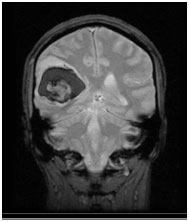What is a brain metastasis?
Malignant tumours that arise elsewhere in the body may secondarily seed in the brain.
What causes brain metastases?
Malignant tumours shed cells that can enter the blood stream. At any one time, a quarter of our total blood volume is in the brain. This makes the brain a common site for secondary brain tumours. There may be only one tumour in the brain or many.
What cancers commonly cause Brain metastases?
In Australia we have a very high incidence of melanoma and so there is a high incidence of metastatic melanoma to the brain. Other cancers that seed in the brain are breast, lung and colon. Melanoma in the brain has a tendency to bleed and cause a sudden rise in the pressure of the brain.

Melanoma with bleeding
Where do brain metastases occur?
Mets can seed in any location in the brain.
How do these tumours affect my health? What symptoms are caused?
Brain mets can cause many different symptoms including (but not exclusively):
- Seizures (fits)
- Headaches
- Loss of use of your arm or leg
- Inability to speak
- Decreased vision, double vision
- Confusion
Sometimes mets can be found incidentally on scans performed for surveillance of your cancer.
What happens after I am diagnosed with a brain metastasis?
Generally with the onset of symptoms, you may have had a CT scan. Or, the tumour(s) may have been picked up on routine screening scans. The next step will be to have a MRI. This will give a more accurate picture of the tumour and other information such as the exact location and the number of metastases. Please see the section on the patient journey for more information.
How is surgery done for metastases?
Surgery
Surgery may be performed on up to 4 tumours in brain. Whether they can be safely removed or not depends on the location.
The surgical technique that Dr Shivalingam uses adheres to the principles of minimally invasive surgery and utilizes stereotactic navigation. Therefore these tumours can usually be remove via small incisions.
How quickly do these tumours grow?
Brain metastases are malignant tumours and so they generally grow rapidly within days or weeks.
What if I don’t have surgery?
Large brain metastases cause symptoms relating to pressure and swelling in the brain (oedema). They can also be life threatening. Therefore the general recommendation for large tumours (>3cm) is to have them surgically removed. However this decision is only made after much discussion and considering other possible options.
What other treatments are available?
Radiotherapy
Small tumours can be treated using a form of focused and targeted radiotherapy called Stereotactic Radiosurgery (SRS).
Sometimes, you may be advised to have whole brain radiotherapy. This is especially the case if there are many brain mets present.
Chemotherapy
Chemotherapy is wide and varied. There isn’t one chemo that treats all cancers. Therefore the chemo that may be recommended to you, will be specific for your cancer. Chemotherapy is usually prescribed and supervised by medical oncologists.
Chemotherapy is largely given to control the cancer in the rest of your body rather than the brain, as most of these drugs do not get into the brain.
Targeted therapies
We are now moving into the era of targeted therapies. These are specially designed molecules that target specific genetic mutations or specific cellular functions within tumour cells. There are many of these drugs in current use for a lot of other cancers. The choice of drug is determined after genetic analysis of your cancer tissue. A lot of these drugs are still only accessible through trials. Please discuss further with your surgeon or medical oncologist regarding what is appropriate for you.
Vaccines
Vaccines are treatments that use the patient’s own immune system to fight the tumour. These can be targeted molecules that enhance certain cells in the immune system. Alternatively, tumour tissue obtained at surgery may be used to stimulate the patient’s own immune system to fight the tumour. Vaccines are also only available currently on a trial basis.

















